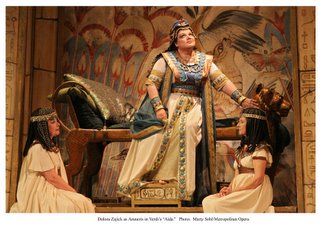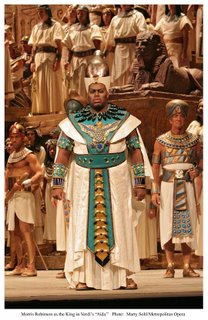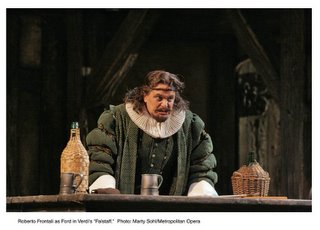Aida
Music by Giuseppe Verdi, libretto by Antonio Ghislanzoni
Performance of Saturday night, October 29, 2005, the 1,085th Metropolitan Opera performance of this work.
Conductor: James Conlon
Aida: Hasmik Papian
Radames: Salvatore Licitra
Amneris: Dolora Zajick
Amonasro: Mark Rucker
Ramfis: Paata Burchuladze
The King: Morris Robinson
Messenger: Ronald Naldi
Priestess: Edyta Kulczak
First three bits of good news - Jean-Paul Fouchécourt, who was injured during last week's
Falstaff, is fine. I wasn't able to find out exactly what happened to him, but it didn't seem too serious - in fact I think he was all right the day after the performance. Second, for the first time in the regular season (I'm not counting the Opening Night Gala), the house was actually full - good news even though I couldn't get a seat. And my new binoculars arrived from E-Bay, enabling me once again to see details of facial expressions even from Family Circle Standing Room. I expect that when I go for
Rigoletto and
La Traviata, where I hope to get Balcony seats, I'll be able to look down the singer's throats!

Armenian soprano Hasmik Papian, publicity shot (I couldn't find any pictures of her as Aida)
I regret that I was unable to see Michele Crider in the title role, but I was prevented by both the Jewish holidays and by my chorus rehearsals. Although I was at Crider's Met debut as Butterfly (big, passionate voice, but clearly nervous and trying very hard not to trip over her kimono) and also saw her Leonora in Il Trovatore (where the voice was still impressive but she clearly had technical problems), I have never hear her sing Aida, which many say is her best role. Hasmik Papian, however, proved to be a more than adequate substitute. Her voice is a bit brighter and more lyric than I like in this role, albeit quite beautiful. There was some scooping and her Italian diction is a bit odd (probably the Armenian accent), but she is a wonderful actress physically and vocally. Her word-painting, particularly in "Ritorna vincitor" and the confrontation with Amonasro, was quite telling and some of her pianissimi in the Nile Scene ("La tra foreste virgini") were exquisite. I can understand why she had a recent triumph in Detroit as Norma. As a matter of fact, there are rumors the Met is doing Norma in 2007-2008 - I wonder if she'll be in the cast? I can't immediately think of anyone who could do justice to the role at the Met, although I would love for Angela Gheorghiu to try it in a smaller theater. Possibly Christine Goerke (fellow SUNY Stony Brook alumna!), who like Papian has had very good reviews for the role in regional houses. Although I wouldn't mind seeing what Jane Eaglen, who has been absent from the Met for a while, could do with the role under and actual conductor rather than an "insulator" like Carlo Rizzi... Actually, if there really is a Norma, I suspect that it will be for house darling Renée Fleming, who recorded (not well, I think) "Casta Diva" and is probably the biggest star they can get for the role.

Salvatore Licitra as Radames
Although I hadn't been that eager to hear Papian before the performance, I was eager to hear Salvatore Licitra live for the first time - the "plazacast" of his Met debut as Cavaradossi (where, as everyone knows, he replaced a flu-ridden Luciano Pavarotti) doesn't really count. At that time I thrilled to the warmth and beauty of his voice, particularly in Tosca's Act I Love Duet, enough that I was willing to forgive him some inartistic moments no doubt engendered by the circumstances of his debut. I was also mostly impressed with his first solo disc (the less said about his pop "duet" album with Marcelo Alvarez, the better), and would have been more so if it had been conducted by someone other than the aforementioned Mr. Rizzi. However, there were quite a few reports, mostly from Europe, that indicated that he could be a quite variable singer.
Admittedly Licitra did not seem quite warmed up for "Celeste Aida", which, of course, is what the majority of the audience is most interested in. This is a standard problem for any tenor considering that this very difficult aria is the first thing he sings. In fact, Jean de Reszke, considered by many to be one of the greatest tenors of the 19th Century, regularly cut it. His first high notes were tight and seemed to be coming from the back of his throat, though the final high B was vigorously sung and equally vigorously (and too automatically) applauded. I suppose it was too much to ask that Licitra would actually take this note "piano, pianissimo, morendo" as Verdi wrote it. Once past the aria, he was fine. On his solo disc he bore an uncanny vocal resemblance to Luciano Pavarotti; this is less evident on stage. While much of his voice was as warm and beautiful as it was in 2002, what most impressive here was the clarity and naturalness of his Italian, at a level that probably only a native can have. He's a fine actor, if just a bit physically stiff - he interacted believably with all the other cast members and his facial expressions were very convincing, but he needs that last touch of individuality and imagination. I regret that he and Papian sang the final "Si schiude il ciel" fortissimo rather than gorgeously pianissimo as many of the best interpreters (notably Milanov and Björling) did.
For better or worse, Licitra seems to be the Met's new "star tenor" around whom new productions are planned and who can get pretty much whatever he wants. His future engagements reportedly include Luigi in Il Tabarro for the new production of Il Trittico in 2006-2007 and Manrico in a new Il Trovatore in 2008-2009 in addition to Canio, Gustavo, and Dick Johnson. As talented as Licitra is, I think his ascent is largely due to political reasons. Joseph Volpe is pushing Licitra because Licitra made Volpe (not the Met - Volpe!) "look good" in the debacle of Pavarotti's Tosca cancellation, and no doubt incoming Met GM Peter Gelb, the former head of Licitra's record label Sony, will be equally generous to someone he knows and presumably loves.

Amneris is Dolora Zajick's greatest role, and by her admittedly titanic standards, her portrayal of Amneris this performance actually seemed ... almost small-voiced at the start - possibly an unannounced cold, or a slightly different manifestation of whatever was affecting the men. Nonetheless, hearing her "blood and guts" voice and portrayal is a joy in an era of too much vocal politeness, and she is genuinely exciting, never vulgar. I do think that Amneris is a much more sympathetic character than Zajick makes her, despite her pain in the Judgement Scene and remorse at the end. Most mezzos, including titans such as Fedora Barbieri and Giulietta Simionato, make Amneris into the villain of the piece, which I'm not quite sure is what Verdi wanted - after all, the opera was almost called Amneris. So far, though, Zajick's only serious competition in this role seems to be Olga Borodina, a somewhat smaller scale but very human Amneris.

Mark Rucker as Amonasro (opera house unknown)
I first heard Mark Rucker back in 1991 or 1992 as Renato in Un Ballo in Maschera, in a telecast from Philadelphia (with Pavarotti as Gustavo, of course - why else would it be telecast?) and was very impressed. I have been wondering for years when he would come to the Met and assume that he would have been there years ago if he wasn't African-American*, especially considering some less than stellar Amonasros in the recent past (Pons? Nucci? Sorry.) I figured if I noticed him, why hadn't the Met, who no doubt has tons of scouts? Well they finally did notice him when he sang Don Carlo in La Forza del Destino with the Collegiate Chorale, probably because they were there to see Licitra as Don Alvaro. Rucker was scheduled only for this one performance of Amonasro (same as for his debut in this role last season - just like every African-American singer except for Crider and Denyce Graves) and - whoopdeedoo! - he has two performances as Don Carlo, again opposite Licitra. Like virtually all the male soloists except Licitra, he seemed to be affected by dryness of voice (the weather might possibly be the culprit here). Because of this, I wondered if maybe the Met got him too late. If the voice wasn't overwhelming, Rucker was a good stage actor and clearly had considerable experience in the role. The good news is that per his website, he will be back next season for both Tonio in Pagliacci and the title role in Rigoletto. Let's hope he gets more than one performance of each this time. At least he isn't being relegated to "black" roles. The sound bites on his website of his Rigoletto sound very promising - powerful, dramatic, and passionate.
Paata Burchuladze has been a decent Grand Inquisitor in the past, but I usually haven't been very impressed with him and here he did nothing to revise my opinion of him upwards. His voice is hollow and his Italian is virtually unintelligible. He's reportedly doing Alvise in La Gioconda next season - for goodness sakes, Met management, if you can get Violeta Urmana, Roberto Alagna, Olga Borodina and Larissa Diadkova, can't you get a really world-class bass, or is four big stars enough?
 Morris Robinson as the King of Egypt
Morris Robinson as the King of Egypt
Frankly, the role of Ramfis should have been sung by Morris Robinson. I first heard this phenomenal young bass in small roles (Mercury in Les Troyens and Second Nazarene in Salome), and immediately wanted to hear him graduate to the big ones. The voice is huge, even cavernous, well-focussed, and most importantly, instantly memorable. Tonight, however, like several other cast members, he was a bit dry in the beginning, and sounded better when singing from the front of the stage - the King is usually towards the back. Robinson sounds like many of the "black basses" of the past, such as Gottlob Frick, Matti Salminen, and maybe even Boris Christoff. And to those who might think that is a tasteless or even a racist pun, he is the only African-American bass I have ever heard who sounds like that - they tend to have very lyric voices - Paul Robeson, in my opinion, sounds a lot like turn-of-the-20th-century French basses such as Edouard de Reszke. However, the good news is that Robinson seems to be a singer the Met wants to promote, as he has represented them in various 9/11 commemoration events and has had quite a bit of publicity. His first major role, Sarastro, comes up in January and February 2006. My immediate impression is that this isn't that good an idea. Yes, Robinson's voice is amazing and he absolutely should be doing major roles, but so far I haven't heard the wisdom, warmth, and kindness Sarastro needs, even if he has the power and authority - he sounds like a villain. However, I'd cast him as the Grand Inquisitor, Fafnir, Hagen, or Kaspar in five seconds flat, and maybe Phillip in 10 years. Osmin or the Commendatore would probably be the best Mozart roles for him now, and I would love to hear him sing the "Tuba mirum" solo from the Requiem. He deserves, and will probably get, major stardom.
The usually reliable, and often excellent, comprimario tenor Ronald Naldi seemed affected by the same dryness as the other men as the Messenger, but Edyta Kulczak was an excellent Priestess. I am a little surprised that the Met is casting Kulczak, who is nominally a mezzo, in a soprano role, though she had no trouble with any of the high notes. Then again, 4 of my Met Priestesses either achieved or are on the way to stardom - and one of them is also a mezzo, Michelle De Young. The others are the aforementioned Christine Goerke, Sondra Radvanovsky, and Indra Thomas.
Oddly enough, James Conlon's conducting made absolutely no impression on me whatsoever, good or bad. Admittedly, I usually only notice conducting when it hits one of those extremes. But considering that Conlon is seriously rumored to be James Levine's replacement as Artistic Director when he leaves in 2011, I want to hear something that I can notice!
The production regularly gets slammed in the press and by some fans for its "Zefirellian excess", but I think that this opera, at least in the house the size of the Met, needs to be a spectacle, even though I usually hate it when the audience applauds scenery or the stage elevator. After all, much of the opera, and not just the Triumphal Scene, takes place in public. I would like to see a more intimate Aida, as it's essentially only about three people - Aida, Radames, and Amneris - but I'm worried that the overwhelming passion would be lost and the intimacy might be joined to directorial stupidity. (Robert Wilson directing Aida? Good grief, Tony, I practically worship you, but what were you thinking?)
Although I admit that I'm hardly a dance expert, I believe that the choreography is some of the worst I've ever seen at the Met, mostly terribly unimaginative and even silly (like the foot flexions timed to orchestral chords in the Triumphal Scene ballet or randomly waving arms in the Dance of the Moorish Slaves). I admit over repeated viewings - this is my sixth visit to this production - the Dance of the Moorish Slaves has grown on me. No doubt it is an attempt, successful or not, to recreate actual Egyptian dance. However, no fault for any of this can be laid at the dancers' feet (sorry) - they did a superb job with what they were given.
One very picky thing - while I certainly wouldn't want the Met to do an Al Jolson on her, I think Papian could have used a little more black makeup as Aida - she looked more very well tanned, possibly Arabic or even Egyptian, than Ethiopian.
I will try to see the spring performances as well, mainly for a repeat of Olga Borodina's Amneris, but I would also like to hear Johan Botha as Radames. He's no actor, but he has a lyric, clarion voice very reminiscent of Ben Heppner, and I have yet to hear him live in Italian opera. Next up at the Met: Cosi fan Tutte on Tuesday.
Finally, an amusing note. Apparently in the performance of Aida prior to this one, the horse that was drawing the chariot carrying Radames in the Triumphal Scene, er... had an accident. Or didn't think Licitra was worthy of being carried by him. At any rate, one of the extras in a loincloth came on with a bucket and a shovel. Hey, who knew that plastic was invented in ancient Egypt?
* I will be posting a tirade about the Met's treatment of African-American singers, especially the men. Eventually. By February for "Black History Month" at this rate!










